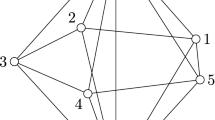Abstract
This paper studies a class of strategic games, where players often collaborate with other players to form a group when making decisions, and the payoff functions of players in such games are presented as vector functions. First, using the semi-tensor product (STP) method, it is proved that a finite game with vector payoffs is potential if and only if its potential equation has solution. By adding a suitable weight vector to the vector payoffs of each player, a finite game with vector payoffs that is not potential can be converted into a potential game. Second, as a natural generalization, the authors consider the verification problem of the group-based potential games with vector payoffs. By solving a linear potential equation, a simple formula is obtained to calculate the corresponding potential function. Finally, some examples are presented and discussed in detail to illustrate the theoretical results.
Similar content being viewed by others
References
Shapley L S, Equilibrium points in games with vector payoffs, Naval Res. Logistic Quart., 1959, 6: 57–61.
Wang S, An existence theorem of a Pareto equilibrium, Appl. Math. Lett., 1991, 4(3): 61–63.
Patrone F, Pusillo L, and Tijs S, Multicriteria games and potentials, Top, 2007, 15(1): 138–145.
Rettieva A, Equilibria in dynamic multicriteria games, Int. Game Theory Review, 2017, 19(1): 1750002: 1–21.
Pieri G and Pusillo L, Multicriteria partial cooperative games, Appl. Math., 2015, 6(12): 2125–2131.
Rosenthal R W, A class of games possessing pure-strategy Nash equilibria, Int. J. Game Theory, 1973, 2(1): 65–67.
Monderer D and Shapley L S, Potential games, Games Econ. Behav., 1996, 14(1): 124–143.
Heikkinen T, A potential game approach to distributed power control and scheduling, Comput. Netw., 2006, 50(13): 2295–2311.
Zhu M and Martinez S, Distributed coverage games for energy-aware mobile sensor networks, SIAM J. Cont. Opt., 2013, 51(1): 1–27.
Hao Y, Pan S, Qiao Y, et al., Cooperative control via congestion game approach, IEEE Trans. Aut. Contr., 2018, 63(12): 4361–4366.
Cheng D, On finite potential games, Automatica, 2014, 50(7): 1793–1801.
Guo P and Han C, Nash equilibrium and group strategy consensus of networked evolutionary game with coupled social groups, Appl. Math. Comput., 2021, 409: 1–11.
Marden J R, Arslan G, and Shamma J S, Cooperative control and potential games, IEEE Trans. Sys., Man, Cybernetcs, Part B, 2009, 39: 1393–1407.
Li C, He F, Liu T, et al., Verification and dynamics of group-based potential games, IEEE Trans. Contr. Net. Syst., 2019, 6(1): 215–224.
Liu T, Wang J, Zhang X, et al., Game theoretic control of multiagent systems, SIAM J. Cont. Opt., 2019, 57(3): 1691–1709.
Marden J R, State based potential games, Automatica, 2012, 48(12): 3075–3088.
Cheng D, Qi H, and Li Z, Analysis and Control of Boolean Networks: A Semi-Tensor Product Approach, Springer, London, 2011.
Li H and Wang Y, Lyapunov-based stability and construction of Lyapunov functions for Boolean networks, SIAM J. Cont. Opt., 2017, 55(6): 3437–3457.
Wang Y and Guo P, Optimal control of singular Boolean control networks via Ledley solution method, J. Frankl. Inst., 2021, 358(12): 6161–6173.
Zhao G, Liang S, and Li H, Stability analysis of activation-inhibition Boolean networks with stochastic function structures, Math. Methods Appl. Sci., 2020, 43(15): 8694–8705.
Yu Y, Feng J, Pan J, et al., Block decoupling of Boolean control networks, IEEE Trans. Aut. Contr., 2019, 64(8): 3129–3140.
Li H and Ding X, A control Lyapunov function approach to feedback stabilization of logical control networks, SIAM J. Cont. Opt., 2019, 57(2): 810–831.
Fu S, Zhao J, and Wang J, Input-output decoupling control design for switched Boolean control networks, J. Frankl. Inst., 2018, 355(17): 8576–8596.
Li H, Zheng Y, and Alsaadi F E, Algebraic formulation and topological structure of Boolean networks with state-dependent delay, J. Comput. Appl. Math., 2019, 350: 87–97.
Lu J, Li H, Liu Y, et al., Survey on semi-tensor product method with its applications in logical networks and other finite-valued systems, IET Contr. Theory Appl., 2017, 11(13): 2040–2047.
Wang Y, Zhang C, and Liu Z, A matrix approach to graph maximum stable set and coloring problems with application to multi-agent systems, Automatica, 2012, 48(7): 1227–1236.
Qi H, Wang Y, Liu T, et al., Vector space structure of finite evolutionary games and its application to strategy profile convergence, Journal of Systems Science & Complexity, 2016, 29(3): 602–628.
Wang Y, Cheng D, and Liu X, Matrix expression of Shapley value and its application to distributed resource allocation, Science China Inf. Sci., 2019, 62(2): 1–11.
Ding X, Li H, Yang Q, et al., Stochastic stability and stabilization of n-person random evolutionary Boolean games, Appl. Math. Comput., 2017, 306: 1–12.
Hao Y and Cheng D, Optimization of multi-criteria facility-based systems via vector potential approach, J. Frankl. Inst., 2021, 358(9): 4972–4993.
Pieri G and Pusillo L, Multicriteria partial cooperative games, Appl. Math., 2015, 6(12): 2125–2131.
Wang Y, Liu T, and Cheng D, From weighted potential game to weighted harmonic game, IET Contr. Theory Appl., 2017, 11(13): 2161–2169.
Wang Y and Cheng D, On coset weighted potential game, J. Frankl. Inst., 2020, 357(9): 5523–5540.
Candogan O, Menache I, Ozdaglar A, et al., Flows and decompositions of games: Harmonic and potential games, Math. Oper. Res., 2011, 36(3): 474–503.
Cheng D, Liu T, Zhang K, et al., On decomposed subspaces of finite games, IEEE Trans. Aut. Contr., 2016, 61(11): 3651–3656.
Author information
Authors and Affiliations
Corresponding author
Additional information
This research was supported by the National Natural Science Foundation of China under Grant Nos. 61903236, 62073202, and 61803240, Shandong Provincial National Science Foundation under Grant No. ZR2018BF021 and China Postdoctoral Science Foundation under Grant No. 2017M622262.
Rights and permissions
About this article
Cite this article
Wang, Y., Li, H. Algebraic Verification of Finite Group-Based Potential Games with Vector Payoffs. J Syst Sci Complex 35, 2131–2144 (2022). https://doi.org/10.1007/s11424-022-1064-1
Received:
Revised:
Published:
Issue Date:
DOI: https://doi.org/10.1007/s11424-022-1064-1




